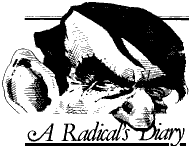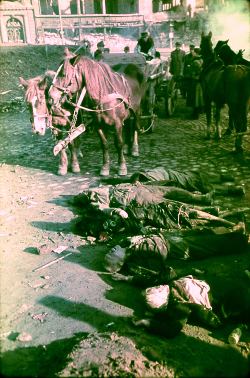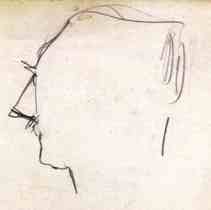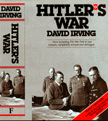 I
stuck to my guns. Hitler chuckled
it. Two months after the book's
publication, The New Yorker ran
that
box. I
stuck to my guns. Hitler chuckled
it. Two months after the book's
publication, The New Yorker ran
that
box.
|

Thursday,
February 14, 2002
London (England) I WORK until 2:30 a.m. as usual,
pausing at two a.m. to pray quietly for
the souls of the hundred thousand
innocents we British burned alive at this
moment in Dresden, 57 years ago
tonight.  In
the morning the mail brings a letter from
the Dresden city archives, expressing
gratitude for my gift of the unique colour
photographs taken by Walter Hahn of
the mass public cremations of the
thousands of dead after the air raids. I
ask them to give any royalties that accrue
to the Frauenkirche rebuilding fund. If
Hahn had not given me those negatives in
1961, the book [The
Destruction of Dresden] would
never have had the impact that it did. In
the morning the mail brings a letter from
the Dresden city archives, expressing
gratitude for my gift of the unique colour
photographs taken by Walter Hahn of
the mass public cremations of the
thousands of dead after the air raids. I
ask them to give any royalties that accrue
to the Frauenkirche rebuilding fund. If
Hahn had not given me those negatives in
1961, the book [The
Destruction of Dresden] would
never have had the impact that it did.
The morning papers carry the obituaries
of Adolf Hitler's last private
secretary Traudl Junge. It's not
often a lowly private secretary gets a
mention in dispatches, but then, as Dr
Joseph Goebbels wrote in January 1945,
"Hitler is the man of the Millennium". A friend sends me a message from
Canada: "Concerning the article on your website
about the death of Traudl Junge, it is
interesting to contrast with this
article
posted on CNN's online web page. You
just knew they had to throw in the
Holocaust somewhere... This is a quote
from the end of the article: It
was during Junge's years serving Hitler
that most of the six million Jews
killed during the Holocaust died,
although she said she never heard Jews
discussed. She said it was only after
the war, when she learned what many
already knew about the Holocaust, that
she felt wracked with guilt for having
liked the "greatest criminal who ever
lived." The Simon Wiesenthal Center has
criticised the screening of the film,
calling Junge's recollections "sheer
fantasy" and "revisionism" and saying
that everyone who was close to Hitler
heard him "rant and rave about the
Jews." The Wiesenthal
Center is lying, and they must know it
(they're those tasteful folk who faked
smoke on the photos of Auschwitz
crematoria chimneys). Every one of
Hitler's private staff was closely
interrogated on precisely this issue by
Americans and British after the war, and
all of them stated independently of each
other that at Hitler's headquarters, in
his secret circle, there was never even
the slightest hint or mention of anything
untoward happening to the Jews in the east
or in the concentration camps. I have the
interrogation reports. On June 9, 1977, I planted Hitler's
personal adjutant Richard
Schulze-Kossens (you can see him in
the background at the Kremlin signing of
the Ribbentrop-Stalin pact in August 1939)
in the London audience of the live David
Frost Programme, and invited this former
S.S. colonel, when I was challenged on
this point, to stand and tell the
multi-million television audience just
that: that from 1942-1944 he had been
charged by Hitler to attend every single
conference, even the most secret ones
alone with Heinrich
Himmler, and that not once had any
extermination of the Jews been discussed
or even mentioned in these conclaves. Frost was not pleased to have
this mystery witness sprung on him: but
there he had it, straight from the horse's
mouth, and next day's national press
grudgingly admitted that I had carried the
day.  TRAUDL Junge served as Hitler's secretary
from 1942 to the end in 1945. I
interviewed her in the sixties, after the
"secret circle" introduced my name to her
and gave her the okay -- that I was "the
Englishman who had written about Dresden",
and I could be trusted not to abuse
confidences.
TRAUDL Junge served as Hitler's secretary
from 1942 to the end in 1945. I
interviewed her in the sixties, after the
"secret circle" introduced my name to her
and gave her the okay -- that I was "the
Englishman who had written about Dresden",
and I could be trusted not to abuse
confidences.
Her colleague Christa Schroeder
was my other best source. She had been
with the Führer since 1933 -- before
her death in 1983, I interviewed her on a
dozen occasions, a fragile piece of memory
being delicately trampled out of her each
time; I once invited her to lunch with
Elke Fröhlich and Rolf
Hochhuth at the Vier Jahreszeiten, or
the Bayerischer Hof, I forget which,
curious to see what the leftwing liberal
playwright and Adolf Hitler's private
secretary would make of each other. It was
a memorable meal. I have a 16mm film of us
walking cheefully down the pavement
afterwards, filmed by Elke using my
Paillard-Bolex. Hochhuth was astonished to hear that
Christa Schroeder had been imprisoned by
the Americans for two years after the war,
resulting in her haughty refusal to talk
with any American writers after that. "What on earth were you imprisoned for,
ma'am?" he exclaimed. "I typed for the Führer!" laughed
Christa. Hochhuth slapped down his knife and
fork, and burst out so loudly that heads
turned all round the elegant restaurant:
"Millions carried guns for the
Führer!" Just inside the front door of the
little studio flat she occupied in
Munich's Belgrade Street, there was a
curtain which she opened only for a few
privileged friends: behind it hung her
little gallery of photos. A few years after that, while I was
still researching Hitler's
War, Christa came clean and
admitted that she had a box of letters she
had written to a lady friend in neutral
Switzerland during the war, on Hitler's
headed notepaper, describing events at the
Führer Headquarters; after a
falling-out, the lady friend had returned
them all to her, wrapped in ribbon; and,
yes, a few pages of a shorthand diary she
had written in 1945. She turned the precious bundle over to
me, after first excising, literally, with
scissors, a number of more delicate
passages from the letters to her friend.
"When I was ill in hospital in 1938," she
said once to me, with a wan smile, "A.H.
came to visit me with flowers." (She
called him A.H., in our long
conversations, or The Chief). A smile of
half-remembered pleasures flickered across
her face, and she added with a wistful
chuckle: "He said, 'People are going to
think I am visiting a secret lover!'" And
that is about as close as they ever came
to a relationship: it remained a crush, at
room's length, no more. Toward the end of her life, she
produced a stack of twenty or thirty
yellowing postcards from behind that
curtain: Hitler, she recalled, desiring to
save the lives of his four brave young
secretaries, ordered them to leave the
bunker around April 22, 1945, as the last
plane was about to fly out of Berlin. The
two youngest, Traudl Junge and Gerda
Christian, refused and stayed on.
Christa Schroeder and the elderly
Johanna Wolf were formally ordered
to fly to Munich, and he told Christa to
go through his private papers there and
destroy everything. She had salvaged these postcards,
sketches by A.H., as mementos: there was
Charlie Chaplin as The Tramp,
sketched by Adolf Hitler, and a Wandering
Jew; the Elbe bridge at Hamburg, a vast
suspension bridge he was planning to build
after the war; pieces of furniture,
victory arches, and a deft pencil
self-portrait, on the back of which he had
sketched two heads of a girl, Geli
Raubal probably, before her suicide in
1931. "I want you to have one, Mr Irving,"
she said. "Take whichever you want."  Of
course there could be no doubt which one,
and she offered, "Shall I sign it to
authenticate who drew it?" Of
course there could be no doubt which one,
and she offered, "Shall I sign it to
authenticate who drew it?"
I replied that she knew who drew it,
and so did I, and that was good enough for
me. Along with the birdie-spoon, given me
by Henrietta von Schirach, it is
one of the harmless mementoes I have
retained from that research era. Later Christa must have regretted her
kindness, and I was told she had remarked
that she could have sold it to pay for an
expensive operation that she needed. I
gave the person who conveyed this message
to me -- she was Otto Strasser's
widow, working at the Institut für
Zeitgeschichte -- an envelope with cash
for Christa (in those days, before the
enemy onslaught on Real History began, I
was comfortably able to make such
donations).  I FOUND Traudl Junge a very different
character, businesslike and brisk, her
memory as sharp as a pin. Her husband
Hans -- whose diary entries for
1943 I had located in the Hoover Library
archives, registering hour by hour all the
visitors to Hitler -- was killed in the
fighting in Normandy in June 1944. Hitler
himself broke the news to her -- it was
one of the deaths that affected him most,
because it was a young man he personally
knew.
I FOUND Traudl Junge a very different
character, businesslike and brisk, her
memory as sharp as a pin. Her husband
Hans -- whose diary entries for
1943 I had located in the Hoover Library
archives, registering hour by hour all the
visitors to Hitler -- was killed in the
fighting in Normandy in June 1944. Hitler
himself broke the news to her -- it was
one of the deaths that affected him most,
because it was a young man he personally
knew.
Traudl handed me a heap of typescript
on which she had worked in the first year
or two after the war, her uncensored
memoirs, and I used them extensively in
Hitler's War,
as my readers will know. With her consent
I donated a set to the Institut für
Zeitgeschichte in Munich, and they are in
the Irving Collection there along with my
interview notes, where they have been
found and tilled by diligent researchers
like "Hitler expert" Ian Kershaw in
more recent years. My favourite
Hitler's War
passage, based on the typescript Traudl
Junge memoirs, is this:  Hitler
was still [January 12, 1945] on
the western front. Two of his
secretaries -- the young but widowed
Frau Junge and the elderly Frau Wolf --
had just returned from leave and
lunched with him at two. Frau Junge had
hitched a truck ride through Munich the
morning after British bombers had
blasted the city with two thousand tons
of bombs, and her emotional description
made his blood boil. "In a very few
weeks this nightmare will suddenly
stop," he pronounced. "Our new jet
aircraft are now in mass production.
Soon the Allies will think twice about
flying over Reich territory." Hitler
was still [January 12, 1945] on
the western front. Two of his
secretaries -- the young but widowed
Frau Junge and the elderly Frau Wolf --
had just returned from leave and
lunched with him at two. Frau Junge had
hitched a truck ride through Munich the
morning after British bombers had
blasted the city with two thousand tons
of bombs, and her emotional description
made his blood boil. "In a very few
weeks this nightmare will suddenly
stop," he pronounced. "Our new jet
aircraft are now in mass production.
Soon the Allies will think twice about
flying over Reich territory."
One anecdote remained
in Frau Junge's memory of that day, and
it illustrates Hitler's bantering
manner with his immediate entourage.
His dog Blondi urgently needed to go
out, and sprang delightedly through the
bunker door with the manservant
summoned for the purpose. "Amazing what
little things can please a dog," Frau
Junge remarked, at which Hitler
laughed, adding: "Not to mention us
human beings too! I was once on the
road for hours on end with my men, and
I had to go on to Magdeburg to open the
first stretch of autobahn there. But
when my convoy of cars was spotted,
more and more cars would fall in
behind. It was often quite impossible
to make an urgently necessary stop in
some wood or other and be alone. And
when we reached this autobahn there was
almost a calamity. Hour after hour we
drove on, dying for a break, but
everywhere they were lining the
autobahn -- Hitler Youth, League of
German Girls, Brownshirts, SS, the lot
-- I had no idea the Party had so many
formations. I felt at that moment it
was too many. Brückner and Schaub
sat petrified with masklike faces next
to me. I had to keep standing, too,
with a fixed grin. Then Brückner
suddenly reminded us: 'Mein
Führer, I had your special train
sent to Magdeburg station!' How glad we
were to see that train."
Julius Schaub cupped
his hand over one ear and grunted in
appreciation of the story. "Mein
Führer, do you remember The
Elephant at Weimar!" "Ja," Hitler
laughed. "That was an old-fashioned
hotel prewar, but well managed. My
regular rooms had running water but no
bathroom or W.C., so I had to walk down
this long corridor and vanish into the
little room at the end. It was sheer
purgatory every time, because when I
left my room word spread around the
hotel like wildfire, and when I emerged
from the awkward closet they were all
waiting to cheer me and I had to give
the Hitler salute and a rather
embarrassed smile all the way back to
my room. Later on I had that hotel
rebuilt."
As Frau Junge
afterward wrote, it was as though there
was no war and Hitler had no cares.
"But those who, like us, knew him well,
recognized that he had recourse to such
small talk as a kind of anesthetic to
distract him from the losses of
territory, equipment, and human life of
which every hour brought fresh
report."
 MY LONG suffering editor at The Viking
Press in New York, Stan Hochman,
was uncomfortable with this passage.
"You're just trying to make him look
human, aren't you," he said restlessly. He
got his revenge. In one line of the book I
had Hitler "chuckling" something about
Benito Mussolini. "David," said
Stan, "American publishers do not allow
you to use chuckle as a transitive
verb." (Yes, those were the days). "You
say something with a
chuckle," he defined.
MY LONG suffering editor at The Viking
Press in New York, Stan Hochman,
was uncomfortable with this passage.
"You're just trying to make him look
human, aren't you," he said restlessly. He
got his revenge. In one line of the book I
had Hitler "chuckling" something about
Benito Mussolini. "David," said
Stan, "American publishers do not allow
you to use chuckle as a transitive
verb." (Yes, those were the days). "You
say something with a
chuckle," he defined.
"Otherwise," he continued, "let me tell
you what will happen. The New
Yorker will quote it in a little box,
with a heading like THINGS
WE NEVER CHUCKLED, and they will
crucify you for this wrong usage." I stuck to my guns. Hitler chuckled it.
Two months after the book's publication,
The New Yorker ran that
box. [Previous
Radical's Diary]Relevant
items on this website:  HITLER'S
WAR Millennium edition, free
download
HITLER'S
WAR Millennium edition, free
download Death
of Traudl Junge | Just
published memoirs
Death
of Traudl Junge | Just
published memoirs
|